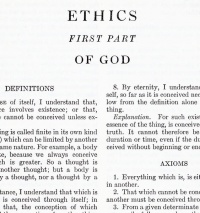Theory
From The Art and Popular Culture Encyclopedia
(Difference between revisions)
| Revision as of 18:13, 27 July 2010 Jahsonic (Talk | contribs) ← Previous diff |
Revision as of 20:01, 29 April 2013 Jahsonic (Talk | contribs) Next diff → |
||
| Line 1: | Line 1: | ||
| [[Image:Ethics by Spinoza.jpg|Spinoza's|thumb|right|200px|By virtue of his [[magnum opus]], the posthumous ''[[Ethics (book)|Ethics]]'', [[Spinoza]] is considered one of [[Western philosophy|Western philosophy's]] definitive ethicists.]] | [[Image:Ethics by Spinoza.jpg|Spinoza's|thumb|right|200px|By virtue of his [[magnum opus]], the posthumous ''[[Ethics (book)|Ethics]]'', [[Spinoza]] is considered one of [[Western philosophy|Western philosophy's]] definitive ethicists.]] | ||
| {{Template}} | {{Template}} | ||
| - | :''[[list of theorists]]'' | + | |
| - | # An [[unproven]] [[conjecture]]. | + | '''Theory''' is a [[contemplation|contemplative]] and [[reason|rational]] type of [[abstraction|abstract]] or generalizing thinking, or the results of such thinking. Depending on the context, the results might for example include generalized explanations of how [[Nature (philosophy)|nature]] works, or even how divine or metaphysical matters are thought to work. The word has its roots in [[ancient Greek]], but in modern use it has taken on several different related meanings. |
| - | #: ''I have a '''theory''' about who broke into the school last night, but I have no proof to back it up.'' | + | |
| - | # An [[expectation]] of what [[should]] [[happen]], [[barring]] [[unforeseen]] [[circumstances]]. | + | |
| - | #: ''So we’ll be there in three hours?'' — ''That’s the '''theory'''.'' | + | |
| - | # A [[coherent]] [[statement]] or set of statements that [[attempt]]s to [[explain]] [[observe]]d [[phenomenon|phenomena]]. | + | |
| - | #: ''There is now a well-developed '''theory''' of electrical charge.'' | + | |
| - | # A [[logical]] structure that enables one to [[deduce]] the possible results of every [[experiment]] that falls within its purview. | + | |
| - | #: ''The '''theory''' of relativity was proposed by Einstein.'' | + | |
| - | # A [[field]] of [[study]] attempting to [[exhaustive]]ly [[describe]] a particular [[class]] of [[construct]]s. <!-- Not quite broad enough to include "music theory". Where do we put that? --> | + | |
| - | #: ''Knot '''theory''' classifies the mappings of a circle into 3-space.'' | + | |
| - | # A [[set]] of [[axiom]]s together with all [[statement]]s [[derivable]] from them. | + | |
| - | #: ''A '''theory''' is consistent if it has a model.'' | + | |
| ==See also== | ==See also== | ||
Revision as of 20:01, 29 April 2013

By virtue of his magnum opus, the posthumous Ethics, Spinoza is considered one of Western philosophy's definitive ethicists.
|
Related e |
|
Featured: |
Theory is a contemplative and rational type of abstract or generalizing thinking, or the results of such thinking. Depending on the context, the results might for example include generalized explanations of how nature works, or even how divine or metaphysical matters are thought to work. The word has its roots in ancient Greek, but in modern use it has taken on several different related meanings.
See also
Namesakes
Unless indicated otherwise, the text in this article is either based on Wikipedia article "Theory" or another language Wikipedia page thereof used under the terms of the GNU Free Documentation License; or on research by Jahsonic and friends. See Art and Popular Culture's copyright notice.

